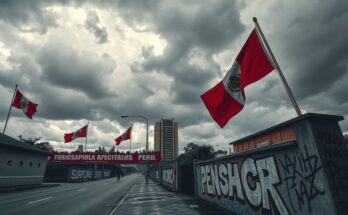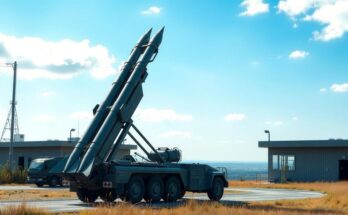Luisa González, attorney and presidential candidate for Ecuador’s Citizen Revolution Movement, campaigns in the February 9 electoral race, seeking to overcome her previous defeat in 2023. Under the significant influence of former President Correa, she promises to combat Ecuador’s crime surge while navigating the complexities of her political identity. González’s campaign continues to draw on the organizational strength of Correa’s legacy.
Luisa González, a candidate for Ecuador’s presidency representing the Citizen Revolution Movement, is competing for the second time following a failed bid in the 2023 snap elections. She is a lawyer with limited political experience but is significantly recognized due to her association with former President Rafael Correa. Her campaign heavily draws on Correa’s legacy, illustrating the sharp political divide surrounding him among the electorate.
Rafael Correa served as Ecuador’s president from 2007 until 2017 and was known for his populist policies, fueled by an economic commodities boom and assistance from China. His administration became increasingly authoritarian, culminating in a corruption sentencing in absentia in 2020. His controversial legacy continues to influence Ecuadorian politics and has positioned González in a complex electoral landscape.
As she campaigns, González has vowed to tackle the rising violence in Ecuador, which has seen a surge due to drug trafficking operations. She claims that under the current president, the homicide rate has decreased but remains significantly higher than in previous years. González has committed to improving public safety, promising to transform the “dark reality of the country” and establish peace instead of violence.
In addressing her political identity, González maintains a careful balance, attempting to assert her independence from Correa’s direct influence while still benefiting from the party’s solid structure. Political analysts recognize her as the only candidate supported by a substantial political organization with a history of electoral success. This strategy may be crucial in a race marked by a split electorate dispatched between supporters and opponents of Correa.
Her campaign has prompted vigorous public responses, with promises of addressing pressing issues such as crime and public safety. The ongoing political tension between conservative and leftist parties in Ecuador sets a dramatic stage for the upcoming election on February 9, where González will appeal directly to the electorate’s desire for change and security.
Luisa González’s political journey is framed within a context of evolving Ecuadorian political dynamics, particularly following the presidency of Rafael Correa. Correa’s impact on Ecuador’s political landscape remains profound, as his followers and opponents represent a stark division. González’s association with Correa offers both an opportunity for garnering support from loyalists but also presents challenges given the polarized perceptions of Correa’s administration.
In summary, Luisa González, as a candidate for Ecuador’s presidency, embodies the complex relationship between past political affiliations and present electoral strategies. Her connections to Rafael Correa shape her identity within the political sphere, positioning her uniquely against a backdrop of rising violence and societal concerns. The February 9 election will be a decisive moment, reflecting the electorate’s response to her campaign and the legacies of Ecuador’s recent political history.
Original Source: apnews.com




